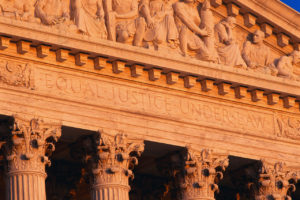Normally I’m not one to jump into discussions about presidential candidates before an election year, as you’ve no doubt noticed based on the one article I’ve contributed to this site, which you may or may not have read. But as I was reading a recent article by Westminster California professor of apologetics and theology Michael Horton (which was included in our Weekly Roundup post this past Sunday), my attention was drawn to a concern surrounding some presidential candidates I hadn’t given much thought to to that point.
In his article, Horton discusses what he sees as problems with the theological views of two of the leading Republican presidential candidates. The candidates in question are Texas Governor Rick Perry and U.S. Representative from Minnesota Michelle Bachmann. Horton delineates the links both have to what the Protestant Reformers called “enthusiasm.” The term, as Horton explains, literally means, “God-withinism.” It’s the term Calvin and Luther used to designate the radical Anabaptists who believed they were the new apostles. Horton states, “Hearing God’s voice directly within, they did not need an external Word (the Scriptures) or the external ministry of preaching, sacrament, and discipline.” Horton indicates that the teachings of enthusiasm are still present in new forms, forms that Bachmann and Perry are reported to have ties to.
Horton’s concern is that their candidacy draws attention to their religious beliefs, aligning their confessed evangelical Christianity with radical enthusiasm, and thus giving credence to these views and muddying the waters for gospel conversations with our friends and neighbors.
Bad theology is something all Christians should be concerned about, not only because of the damage it can do within the church, but because of how it represents the gospel in the eyes of the watching world. In my post last week I urged Christians to be careful when trumpeting celebrities who make professions of faith because they oftentimes end up bringing reproach upon the gospel by their actions. Similarly, it ought to concern us that attention is being drawn to the questionable theology of these candidates, theology the biblically illiterate society won’t distinguish from orthodoxy.
Let me be clear: I’m not questioning the authenticity or sincerity of either candidate’s faith. And my interest in Horton’s article is not even with the particular link he sees between these candidates and the theology of enthusiasm. I’m more interested in the concept that a political candidate’s Christian faith can lead to the media’s uncovering of theological skeletons that could do damage to the church’s proclamation of the gospel.
But how are we to respond in light of this concern? Should the specious theological views of a candidate keep us from voting for them? I’m not ready to say it should. The church of Jesus Christ is quite often going to have to deal with the biblical illiteracy of the secular world. And in a nation where the vast majority of politicians claim an affiliation to some form of Christianity, we’d have a hard time finding candidates with an orthodox faith and a worldview informed by that faith to vote for.
Additionally, it seems to me that the attention drawn to Christian theology and practice that fall outside of orthodoxy will continue existing in many other sectors of our society. It will be present on the New York Times bestseller list. You’ll find it whenever natural disaster or large-scale tragedy strikes and an outspoken pastor makes an insensitive or thoughtless remark. This is not to discount Horton’s concern; I’m simply not convinced that it should be enough to keep us from voting for a candidate whose political views may otherwise be right on (and to be fair, I’m not sure Horton would even say it should). Rather, we ought to confront the theological error on its own terms in the same way we’d address a popular book by a Christian author that spouts heresy (Duh, winning!).
A bigger concern of mine with respect to candidates’ religious beliefs is how they use them as a means of drawing support. After all, many evangelicals will vote for a candidate simply because he or she claims to be a Christian. This uncritical support reeks of a particularly ugly form of ignorance and intellectual laziness. As concerns the 2008 presidential election, there were major problems with President Obama’s brand of Christianity during his run for office. Likewise, there were problems with Republican candidate Mike Huckabee’s (namely his connection to Kenneth Copeland). Conversely, during the race for the Republican presidential nomination that year you’ll recall that many evangelicals, with respect to Mitt Romney’s candidacy, were quite vocal about their opposition to the idea of a Mormon in the Oval Office. (Evangelical Theologian Wayne Grudem, gave a thoughtful response in Romney’s defense, however convincing it may or may not be.) In both cases, the professed religion of the candidate was the deciding factor when these evangelicals cast their vote.
The threat to the church’s witness to the gospel posed by Bachmann’s and Perry’s connections to enthusiasm seems to me to be less serious than the threat posed by Obama’s Christianity. What brings more reproach on the gospel is not Bachmann’s or Perry’s relatively loose connection to an old heresy, but virtually the entirety of Obama’s political agenda concerning the so-called “moral issues”. I’m less concerned that the world will see Bachmann or Perry and believe that the Bible teaches that there are modern-day prophets or apostles than I am that the world will see Obama and think that abortion doesn’t contradict the clear teachings of the Bible.
The concern Horton addresses is not one we should take lightly. It’s an issue that I’m sure many evangelicals, like me, should give more thought to as the presidential election approaches. Regardless of how this concern shapes the way we vote, we understand that the way the gospel is portrayed to the world is something we should have a deep interest in. The scrutiny the Christian message is under won’t go away the first Tuesday in November 2012.





3 Comments
Leave your reply.